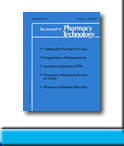 |
 |
EVALUATION OF ACE
INHIBITOR THERAPY FOR CONGESTIVE HEART FAILURE IN AN OUTPATIENT SETTING
Barry E Bleske, Laura A Cornish, Steven R Erickson,
and John M
Nicklas
To request full article click here.
OBJECTIVE: Angiotensin-converting enzyme (ACE) inhibitor therapy is considered the standard of care for the treatment of congestive heart failure. Despite this, clinical experience suggests that not all patients may be receiving ACE inhibitor therapy or may be receiving low dosages. This study was performed to better understand the use of ACE inhibitor therapy in clinical practice.
DESIGN AND PARTICIPANTS: We reviewed the medical therapy of 110 patients with a history of congestive heart failure referred to an outpatient heart failure clinic at a university teaching hospital.
OUTCOME MEASURES: This observational study evaluated the use of ACE inhibitors, including dosage, as well as other drugs to treat congestive heart failure.
RESULTS: Approximately 85% (93/110) of patients were receiving an ACE inhibitor. Twenty percent (22/110) were receiving enalapril 20 mg/d or more, captopril 150 mg/d or more, lisinopril 20 mg/d or more, or quinapril 40 mg/d or more. The remaining patients (n = 71) were receiving these drugs at lower dosages. However, 21 of the remaining patients (19% of all patients) were receiving lower dosages based on patient-specific parameters; 47 of the remaining patients (43% of all patients) were eligible to have their dosage increased. Ten eligible patients were not receiving an ACE inhibitor. The majority of patients were also receiving digoxin (70%) and loop diuretic (80%) therapy.
CONCLUSIONS: Approximately 85% of patients were receiving ACE inhibitor therapy, with 9% of eligible patients not receiving an ACE inhibitor. In the patients receiving ACE inhibitor therapy, approximately 50% (47/93) were receiving dosages below those suggested in the guidelines. Overall, the use of ACE inhibitor therapy is varied and intervention appears required to ensure that all patients receive appropriate therapy for the treatment of congestive heart failure.
To request full article click here.
|
|
|
||
|

